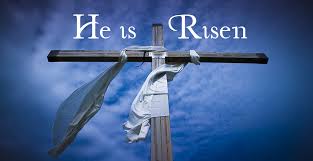Episodes

Monday Apr 02, 2018
The "Empty" Promises of Easter (second half)
Monday Apr 02, 2018
Monday Apr 02, 2018
The “Empty” Promises of Easter
Matthew 28:1-10; Mark 16:1-8; Luke 24:1-12,
John 20:1-18
April 1, 2018
God never made a promise that was too good to be true!
The Empty Cross.
Because the cross was empty, we have the promise of forgiven ___________.
The promise of the empty cross is that you and I stand ____________. Because it was on that cross that Jesus paid the ___________ for our sins.
We have “_____ sinned, and fallen short of the glory of God.” Romans 3:23
– according to God’s law - “the wages of sin is _________.” Romans 6:23
However, when you look at that empty cross – it is a reminder of God’s promise that we have been forgiven. On that cross – Jesus paid the penalty for our sins.
God’s word tells us again – “God _____________ His own love toward us, in that while we were _______ sinners, CHRIST DIED FOR US!” Romans 5:8
Then there is the “empty Tomb”
The fact of the empty tomb is the truth of the _______________ of Jesus Christ and the promise to every one of us that we too will be ________ to eternal life. Romans 6:5
1 Corinthians 15:51-54 (NASB)
51 Behold, I tell you a mystery; we will not all sleep, but we will all be changed,
52 in a moment, in the twinkling of an eye, at the last trumpet; for the trumpet will sound, and the dead will be raised imperishable, and we will be changed.
53 For this perishable must put on the imperishable, and this mortal must put on immortality.
54 But when this perishable will have put on the imperishable, and this mortal will have put on immortality, then will come about the saying that is written, "DEATH IS SWALLOWED UP in victory.
There is one more promise that I want you to know about Easter. It is the promise of the empty burial clothes.
You see, that is the promise of the empty burial clothes – Jesus is alive, and wants to _____________ with you.
Revelation 3:20 (NASB)
20 ~'Behold, I stand at the door and knock; if anyone hears My voice and opens the door, I will come in to him and will dine with him, and he with Me.

Monday Apr 02, 2018
The "Empty" Promises of Easter
Monday Apr 02, 2018
Monday Apr 02, 2018
The “Empty” Promises of Easter
Matthew 28:1-10; Mark 16:1-8; Luke 24:1-12,
John 20:1-18
April 1, 2018
God never made a promise that was too good to be true!
The Empty Cross.
Because the cross was empty, we have the promise of forgiven ___________.
The promise of the empty cross is that you and I stand ____________. Because it was on that cross that Jesus paid the ___________ for our sins.
We have “_____ sinned, and fallen short of the glory of God.” Romans 3:23
– according to God’s law - “the wages of sin is _________.” Romans 6:23
However, when you look at that empty cross – it is a reminder of God’s promise that we have been forgiven. On that cross – Jesus paid the penalty for our sins.
God’s word tells us again – “God _____________ His own love toward us, in that while we were _______ sinners, CHRIST DIED FOR US!” Romans 5:8
Then there is the “empty Tomb”
The fact of the empty tomb is the truth of the _______________ of Jesus Christ and the promise to every one of us that we too will be ________ to eternal life. Romans 6:5
1 Corinthians 15:51-54 (NASB)
51 Behold, I tell you a mystery; we will not all sleep, but we will all be changed,
52 in a moment, in the twinkling of an eye, at the last trumpet; for the trumpet will sound, and the dead will be raised imperishable, and we will be changed.
53 For this perishable must put on the imperishable, and this mortal must put on immortality.
54 But when this perishable will have put on the imperishable, and this mortal will have put on immortality, then will come about the saying that is written, "DEATH IS SWALLOWED UP in victory.
There is one more promise that I want you to know about Easter. It is the promise of the empty burial clothes.
You see, that is the promise of the empty burial clothes – Jesus is alive, and wants to _____________ with you.
Revelation 3:20 (NASB)
20 ~'Behold, I stand at the door and knock; if anyone hears My voice and opens the door, I will come in to him and will dine with him, and he with Me.

Monday Mar 26, 2018
Blessed are the Merciful, for They Shall Receive Mercy
Monday Mar 26, 2018
Monday Mar 26, 2018
“Blessed are the Merciful, for they shall receive mercy.”
March 25,2018
We are not meant to _______________ our Christianity.
Our Christianity is meant to _____________ us!
The Roman philosopher said that mercy was “the disease of the soul”...a sign of ______________!
The Greek word for mercy is “eleos”, which means to be merciful or sympathetic. It recognizes _______ in another person, and reaches out to meet that _____.
The Hebrew definition is “the ability to step into another person’s skin until we can see with that persons eyes, think with that persons mind, and feel with that persons heart.”
Love acts out of ________; mercy gives out of _________.... Mercy lends its help.... Love gives its heart!
It IS genuine compassion, with pure unselfish motives that reach out to help.
Mercy is____________ the need, not just ___________ it!!!
God is the _____________ of mercy. Ephesians 2:4-5
4 But God, being rich in mercy, because of the great love with which he loved us,
5 even when we were dead in our trespasses, made us alive together with Christ— by grace you have been saved—
This points out that while Mercy springs forth from the Love of God, it is linked to forgiveness of God by _____ _________!
We should be moved with compassion when we are confronted with those in need, resisting the temptation towards ________________.
mercy must always be based on truth, thus it goes beyond sympathy... it does not overlook or condone sin. In fact, the merciful thing to do is to ___________ wrongdoing.
We do not earn mercy by showing mercy... rather we recognize God’s mercy toward us and then we demonstrate it to others.
It is our __________ __________ to God for mercy every time that we sin.... And as we receive more mercy we are able to demonstrate more mercy...
So, how do we demonstrate mercy???
Spiritually:
by sharing the gospel with those who are lost,
confronting others about their sin,
Practically:
helping a hurting child,
visiting a hospitalized friend or even an enemy,
forgiving an offender,
befriend a loner,
feed a hungry person, etc.etc..

Monday Mar 19, 2018
Blessed are those who hunger and thirst....
Monday Mar 19, 2018
Monday Mar 19, 2018
Matthew 5:6(ESV)
“Blessed are those who hunger and thirst for righteousness, for they shall be satisfied (filled, completely satisfied).”
March 18,2018
... we are not meant to hunger and thirst after ___________
... we are not meant to hunger and thirst after ____________
... If we want to be truly happy, and blessed we must hunger and thirst after_________________...
Just what is Righteousness??
it means a desire to be free from sin, because sin ____________ ___ from God.
Therefore, it means a desire to be ______________with God...
.... it is that desire to be free from the___ _____________ to sin and for sin.
To hunger and thirst after righteousness is nothing but the longing to be ___________ _______.
Just what does it mean to hunger and thirst...
It means a consciousness of our need to the point of ___________....
it speaks of something that keeps on until it is ______________.
The words that Jesus uses here are framed in the continuous ... the ones who ARE hungering... the ones who ARE thirsting...
What is the result of this? ….They shall be filled!!!!
it speaks of an ___________ satisfaction. They have all that they want.
So, how do I know if I’m really hungering and thirsting after righteousness??
- Are you ___________ with yourself?? Or do you feel a constant pain of always falling short???
- Does anything ____________ satisfy you? Do you find that things have a lot of influence on how you feel?
- Do you have an ____________ for the Word of God? If we do not spend time in God’s Word, we will never greatly desire to live for God.
- Are you digging the sin out of your life?? Sin short-circuits the ______________ line between God and us.
- How is your _________ _______?? The secret of a victorious walk is to keep in constant communication with the Commander.
- Finally, to be spiritually strong, we must spend time with the right kind of people... Heb 10:25 encourages us to forsake not the assembling of ourselves together....
- That includes sharing your _________....

Monday Mar 12, 2018

Monday Feb 26, 2018
Blessed are The Meek, for They Shall Inherit the Earth.
Monday Feb 26, 2018
Monday Feb 26, 2018
“Blessed are the Meek, for they shall inherit the earth.”
February 25,2018
The meaning of meekness was ___________ or _________
meekness: the ________________ between a hot headed temper that was rooted in anger, and a spineless indifference to the injustice that occurred in the world.
used of the man who did not give ______, _______ answers to others -- one who did not demand his _______________!
It was the word that was used of an animal that had once been wild, but now was ________ and _______.
a “soothing _______________ that brought healing to the body”.
Brokenness focuses on _______________________
Meekness focuses on ________________________
______________________________________________________________________________________________________________________________________________________________________________________________________________________________________________________________________________
Meekness is a gentleness and a mildness, and a subdued character, but it is not _______________.
IT IS POWER UNDER _________________...
it is a byproduct of self-emptying... of self-humiliation, of brokenness before God.
As with so many of the virtues of the Christian life, meekness is a word of ________________.
This is not a natural reaction, it is supernatural...therefore it is not surprising that meekness is a part of the _______________.
The result of meekness:
first, they are “blessed”...that word Makarios... it is the experience of a deep abiding, true joy... based on an eternal ___________________________!!!!
Second, “The meek shall inherit the earth”...
The word that is used her in the Greek means “to receive an _________________”....
Because we belong to Christ, our place in the kingdom is as _____________ as His.
Inherit is a future tense verb... we’re going to be there as a part of the kingdom... we are going to reign with Christ! (I Cor. 3:21-23)

Monday Feb 19, 2018
Blessed are Those Who Mourn...2-18-18
Monday Feb 19, 2018
Monday Feb 19, 2018
“Blessed are those who mourn, for they shall be comforted.”
February 18,2018
The word that Jesus used for “mourning” here (pentheo) is strongest, most severe of all nine Greek words used for grief in the Scriptures.
___________________________________________________________________________________
____________________________________________________________________________________
Psalm 32:1-2
1 How blessed is he whose transgression is forgiven, Whose sin is covered!
2 How blessed is the man to whom the LORD does not impute iniquity,…
Comforted is from Greek word parakaleō, the same word that, as a noun, is rendered “Comforter”, or “Helper”.
________________________________________________________________________________________________________________________________________________________________________
Romans 7:14-25
________________________________________________________________________________________________________________________________________________________________________________________________________________________________________________________________________________________________________________________________________________________________________________________________________________________________________________________________________
The Benefits of Mourning:
Mourning protects a believer from __________.....
Mourning focuses a believer on the true ________ of comfort.....
Mourning causes us to seek _______ for Christ.....

Monday Feb 12, 2018

Monday Feb 05, 2018

Monday Jan 29, 2018
Blessed Be The Poor In Spirit For Theirs Is The Kingdom Of God
Monday Jan 29, 2018
Monday Jan 29, 2018
Blessed are the Poor in Spirit for theirs is the Kingdom of God
January 28,2018
Blessed….
This word was used to express a quality that was attributed to the Greek gods...
- An almost unbelievable state of__________.
- Denote someone or something that was___
__________, that neither needs nor is dependent on the outside world for its sustenance.
The Christian is to be God-sufficient and not _______________conditioned....
If a man wants to be truly fulfilled, to find real Joy, to enjoy true blessedness, then he must abandon conventional earthly thinking about what it means to be truly blessed.
The spiritual pre-requisite: being ________ in Spirit
Two different Greek terms that describe the concept of poverty.
One is that of a person who is poor, but has_____ ______. Example Luke 21:2....
The second term is used to describe the _______ _____of an individual who has no resources whatsoever.. Example Luke 16:19
It is this second Greek term that Jesus uses here in this first Beatitude: “blessed are the spiritually destitute.”
In the Old Testament, the term poverty was closely associated with genuine ________ before God.
Humility is the simple prerequisite that functions as the door of all of the beatitudes !
The promise...
First, participation in God’s kingdom is ________________to true happiness.
Second, kingdom participation is ______________for those who become “Poor in Spirit.”
Third, the kingdom of heaven is a _______
________to all who are poor in spirit.

